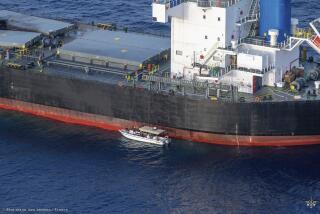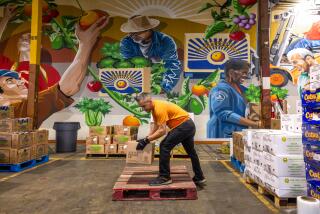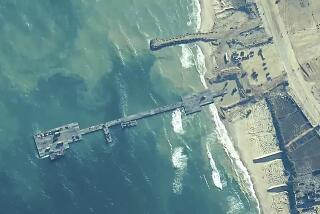Baidoa Gets First Relief Convoy in Months
- Share via
BAIDOA, Somalia — Bristling with machine guns, a large convoy carrying 300 tons of precious wheat rolled into a joyous reception here Sunday and symbolized an ironfisted halt to the looting of food for starving people.
“This is the start of the end of the humanitarian crisis,” said Paul Mitchell, spokesman for the World Food Program.
Seventy heavily armed Marines from Camp Pendleton and Twentynine Palms stood vigil on 20 military vehicles that accompanied the 20 grain trucks during a grueling 156-mile, seven-hour journey from Mogadishu.
A menacing helicopter gunship patrolled overhead as the slow-moving convoy dodged countless gigantic potholes and passed thousands of waving Somalis in villages and towns during the long journey to Baidoa.
It’s been months since an overland convoy of relief had reached Baidoa, where officials estimate that 300 people were dying daily last September. In November, marauders attacked 27 trucks headed here, leaving only two vehicles to reach their destination.
The success of Sunday’s convoy was widely accepted as evidence that the raiders have been vanquished, at least for now.
American and French troops secured Baidoa on Dec. 15 and were later reinforced by U.S. Army troops.
“Everybody ran to the brush when the Americans came,” said Abd Kadir Divye Alohe, a 22-year-old former soldier in Somalia’s civil war.
“All the gangs have gone, and I don’t think they’ll come back,” he said.
The Marines were greeted by hundreds of dancing and clapping people as the convoy entered the crowded city where nearly all of the stone buildings either have been reduced to rubble or show the scars of war.
While many Marines found their task thrilling, they were preoccupied with the possibility of armed attack along the narrow highway leading to Baidoa.
“We know where the weapons systems were placed and where individuals with automatic weapons were seen. We had a good idea where the threats were,” said Capt. David Guth of Twentynine Palms, who led the convoy.
He was relieved that despite encounters with several armed Somalis along the route, there was no exchange of gunfire.
“We didn’t see the small arms we expected,” he said, offering hope that the raiders, called technicals, will stop their violence now that an international peacekeeping force has moved inland to restore order.
“Maybe we’ll go home sooner,” Guth said. “Maybe the technicals will disarm.”
The Marines, stifling under the broiling sun in their heavy flak jackets, were grateful when the uncomfortable drive ended.
“It was long, too long,” said Sgt. Paul Reilske of Twentynine Palms.
But if the technicals had tried anything, the Marines were ready.
“If they had popped a cap, we would have wasted them,” he said.
The exhilaration of delivering enough wheat to feed 100,000 people for one week was felt by officials of relief agencies.
“The whole presence of the military has made a tremendous difference,” said Mitchell. “We would never have been able to get a convoy here like this before.”
He believes the convoy marked a new beginning for relief efforts.
“This is truly one of the more momentous days in the history of the relief effort in Somalia,” Mitchell said.
However, he cautioned that people are still suffering and that the looters won’t be neutralized until their guns are confiscated.
The death rate from starvation has declined--although Mitchell doesn’t know by how much--but he said the situation is still tragic in this region.
“There are still a lot of people malnourished and a lot of people in trouble,” he said.
The World Food Program estimates that 250,000 people in the Baidoa region require dry rations and another 100,000 need supplementary feeding.
The food that was delivered will be immediately sent to 20 area distribution centers.
More to Read
Sign up for Essential California
The most important California stories and recommendations in your inbox every morning.
You may occasionally receive promotional content from the Los Angeles Times.













